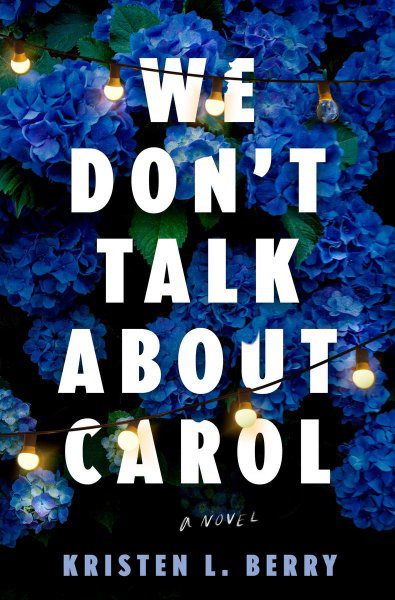I’m a little late in sharing Oline Cogdill’s review of We Don’t Talk About Carol by Kristen L. Berry. I was waiting to see if there were signed copies available through The Poisoned Pen. You can still order signed copies at the Webstore, https://bit.ly/4lYekGj. Thank you to Cogdill for her review. It originally appeared in the South Florida Sun Sentinel.
Book review: Find out why ‘We Don’t Talk About Carol’ in insightful debut mired in secrets
‘We Don’t Talk About Carol’ by Kristen L. Berry; Bantam; 336 pages; $30
Technology has made keeping family secrets more difficult. Ancestry databases and DNA testing have brought many secrets to the forefront, not to mention revealing unknown and perhaps unwanted relatives. But there still are old-school ways of uncovering confidences — a stray letter, a hidden photograph, an odd comment that just slips out.
That setup propels “We Don’t Talk About Carol,” Kristen L. Berry’s insightful debut, which tackles racism, family, community, motherhood and decades of secrets wrapped in a solid plot filled with believable characters and situations.
Sydney Singleton was 13 years old the first time she found the “sepia-tinged” photograph of a girl about her age in a “badly tarnished” frame, hidden in a drawer at her grandmother’s Raleigh, North Carolina, home. Sydney didn’t recognize the girl, who looked a lot like her and was pictured with her grandmother. When Sydney asked her grandmother about the girl, the older woman took the frame, turned it face down on top of the refrigerator and said only, “We don’t talk about Carol.”
The photograph surfaces again 26 years later when Sydney, her mother and sister are cleaning out the home of her grandmother, who recently died at age 91. This time, she gets more information, although scant. Carol was her late father’s sister who vanished when she was around 17 years old. Carol’s disappearance was fraught with complications. Sydney’s grandmother believed Carol may have run away, seeking a singing career in Detroit, so she didn’t involve the police. But during that same time period in the 1960s, six other Black teenage girls had disappeared from the same area of Raleigh.
Sydney, who spent a decade as a crime reporter, plunges into investigating what happened to those teenagers as well as to her long-lost aunt. Her investigation brings up memories of when she became obsessed with another disappearance, which she covered. But Sydney pulls on her skills as a journalist, interviewing the victims’ families, culling through news stories to get an idea of what was going on during that time frame, and reading an old diary that was hidden in a crevice in her grandmother’s home.
As she attempts to piece together her extended family, Sydney also must concentrate on her immediate family. Her strong marriage is under stress due to the difficult fertility treatments she is undergoing. The relationships with her sister and her mother also are strained.
Berry melds the myriad personal stories and intense character studies into a powerful plot, showing how the disappearance of the girls affected their families, immediate neighbors and community as a whole for decades.
“We Don’t Talk About Carol” marks the beginning of a new talent.

